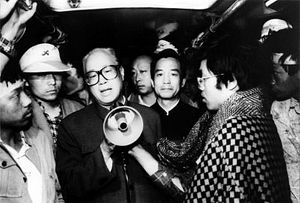The Roman penalty Damnatio Memoriae –– literally, “condemnation of memory” — was considered one of the worst punishments that could be imposed on a political, religious, or criminal offender in the Roman state. In order to inflict maximum shame on a person and his family, the offender would suffer the indignity of being removed from history, and therefore memory.
Other ancient states used the practice before the Romans. Egypt famously deleted most of the historical record of Queen Hatshepsut, who reigned in the 15th century B.C. Her crimes were that she was a woman, and successful.
In the minds of many in the modern world, the practice is most associated with the Soviet Union. Those who fell out of favor with Stalin in particular were simply deleted from all mention in the historical record. Images of the individual suffering this ignominy were removed from the photographic record, in an early version of the concept of photoshopping.
When the ashes of Zhao Ziyang were buried last month in a cemetery north of Beijing, the world was reminded that China, too, treats those who commit political heresy to a similar fate.
That Zhao, the reformist general secretary of the Chinese Communist Party during the Tiananmen Square protests in 1989, was not buried at Babaoshan in western Beijing, the traditional final resting place of Chinese leaders, is hardly surprising. For more than 30 years, Zhao has been written out of Chinese history for showing sympathy and support to the student demonstrators in Tiananmen Square in 1989.
Because of that sin, and for refusing to back the military action that ended the demonstrations on June 4, 1989, killing untold numbers of civilians as well as soldiers, the generation that has since grown up inside China knows hardly anything about Zhao. He remained under house arrest from June 1989 until his death in 2005.
Despite the fact that Zhao was purged and quite literally “erased” from mention in China, he nonetheless achieved nearly folk hero status among human rights advocates both in and out of China. And because he sympathized with the students, Zhao’s political martyrdom at the hands of the rest of the Chinese leadership cemented his place in the international mindset as a victim of a brutal regime.
However, it cannot be forgotten that Zhao was a dedicated Communist, and that, as his leaked papers show, he was a reformist only to certain limits. His inclination and efforts were far more focused on economic reforms than on political ones, as is evidenced by his achievements in turning around the economy in Sichuan province when he was Party secretary there in the 1970s.
But even if Zhao was a man of ambiguities, that does not defend his disappearance at the hands of Deng Xiaoping and the rest of the Chinese Communist Party leadership. What happened to Zhao was, and was meant to be, the ultimate humiliation. No official charges were ever brought against him, calling into question the legal status of his detention and forced disappearance from society, albeit in a society in which the rule of law in the first place is weak and subordinate to the will of the CCP.
The larger issue of Zhao’s treatment at the hands of the Party and government leadership is not that of a powerful man brought down, but the mindset of a political system that would functionally cause a human being of any stature to cease to exist in the official record.
In China, Zhao Ziyang’s very name became as taboo as any discussion outside of the party line about Tibet, Taiwan, or the Tiananmen Square crackdown. Foreigners in China quickly learned to refrain from any mention of Zhao with Chinese colleagues and friends.
The censorship of not only a name but the person holding it feels as ancient as its Egyptian and Roman predecessors.
Indeed, erasing a human being from the record seems to fit better in a toolbox alongside the rack, the plank, and the dungeon than within a 21st century basket of political machinations. This dehumanizing, Dark Ages manipulation of both public history and private lives did not end with a previous set of Chinese leaders, however. It continues to this day.
And that is what makes what happened to Zhao Ziyang so disturbing. It happened 30 years ago, but the sanction against Zhao persists within the Chinese Communist Party of Xi Jinping. That makes today’s CCP as culpable for the use of a cloaking device to “vanish” a political heretic as the CCP of three decades ago was in 1989.
When Zhao’s remains were finally laid to rest next to his those of his wife, it was done in secrecy, with final permission for the ceremony to take place given only at the last minute, according to the family. That indecency cannot be laid at a previous leadership’s feet.
For all that the Chinese leadership today references itself as a 21st century power, ancient despotic practices intended to rewrite history at the cost of a person’s very existence show a glaring gap between China’s aspirations and its preparedness for the modern world.
































